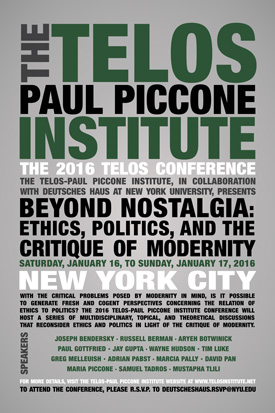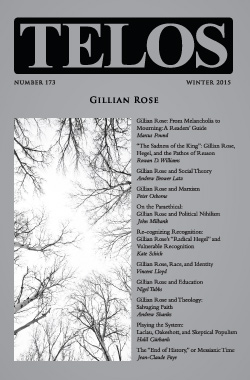By Simas Čelutka · Tuesday, February 23, 2016 In his essay “Carl Schmitt on Friends, Enemies and the Political,” Andrew Norris inquires into the question that I have been interested in for quite some time: political friendship in Carl Schmitt’s political philosophy. Schmitt’s interpreters usually focus on the issue of enmity in his concept of the political, not least because Schmitt himself elaborates on the existential significance of political enmity much more extensively. From a conceptual point of view, however, political friendship should be viewed as at least equally relevant a part of Schmitt’s account of the political. The specific criterion of the political is famously the distinction “between friend and enemy,” not simply an indefatigable presence of political enmity. Norris should be lauded for his attempt to foreground a crucial, though still insufficiently explored, notion of a political (public) friend in Schmitt’s Concept of the Political.
Continue reading →
By Lukas Szrot · Monday, February 22, 2016 The following paper was presented at the 2016 Telos Conference, held on January 16–17, 2016, in New York City. For additional details about this and upcoming conferences, please visit the Telos-Paul Piccone Institute website.
 What is modernity? First, a period “occasioned by a peculiarly ahistorical view of the world, which is flattened into an eternal present. The world we experience appears to exhaust all possible worlds.” Second, modernity is deeply rooted in the three Kantian principles of Enlightenment: “‘What can know?’ the question of knowledge; of the ‘What should I do?’ which is the question of ethics, and of the ‘What can I hope?'” What is modernity? First, a period “occasioned by a peculiarly ahistorical view of the world, which is flattened into an eternal present. The world we experience appears to exhaust all possible worlds.” Second, modernity is deeply rooted in the three Kantian principles of Enlightenment: “‘What can know?’ the question of knowledge; of the ‘What should I do?’ which is the question of ethics, and of the ‘What can I hope?'”
The Western modern project is dependent upon both Greek and Hebrew antiquity. In ancient Ionia, Thales of Miletus predicted a solar eclipse, Anaximander predicted the changing of the seasons, Theodorus invented the ruler, the carpenter’s square, and the level, and Hippocrates began accumulating medical knowledge through trial and error. These “pre-Socratic” Ionians were merchants and artisans; they worked with their hands, whereas the Athenians were engaged primarily in contemplation.
Continue reading →
By Vicente Medina · Friday, February 12, 2016 The following paper was presented at the 2016 Telos Conference, held on January 16–17, 2016, in New York City. For additional details about upcoming conferences and events, please visit the Telos-Paul Piccone Institute website.
 While the expression “moral relativism” means different things to different people, I offer the following characterization of it. By “moral relativism,” I understand a normative view that explains people’s incommensurable moral judgments based on their subjective preferences or on different action-guiding contexts. Moral relativists deny that value judgments can be universally justified. Therefore, for them, value judgments have neither objective universal truth-value nor universal moral import. That is, these judgments are neither true nor false, nor right or wrong for everyone. For some moral relativists even to raise the possibility of moral disagreement across different cultures or communities would be simply moot. While the expression “moral relativism” means different things to different people, I offer the following characterization of it. By “moral relativism,” I understand a normative view that explains people’s incommensurable moral judgments based on their subjective preferences or on different action-guiding contexts. Moral relativists deny that value judgments can be universally justified. Therefore, for them, value judgments have neither objective universal truth-value nor universal moral import. That is, these judgments are neither true nor false, nor right or wrong for everyone. For some moral relativists even to raise the possibility of moral disagreement across different cultures or communities would be simply moot.
Moral relativists can assume a subjective or a contextual point of view. If they assume a subjective point of view, one might describe their theories or hypotheses as nihilistic. Nihilists recognize no transcendent moral values and no moral facts. According to them, predicates, such as right or wrong, or good or bad, have no independent reference. So nihilists recognize no significant moral difference between, for example, the deliberate killing of the objectively innocent, which is considered murder by most civilized people, and killing in self-defense. For them, even the principle of the presumption of innocence would be vacuous.
Continue reading →
By Kenneth D. Johnson · Monday, February 8, 2016 Kenneth D. Johnson is affiliated with the William J. Seymour Institute for Black Church and Policy Studies, in Boston. The following paper was presented at the 2016 Telos Conference, held on January 16–17, 2016, in New York City. For news about upcoming conferences and events, please visit the Telos-Paul Piccone Institute website.
Introduction
The spate of killings of unarmed African American males by police and vigilante residents has continued to roil public opinion in the black community, leading to various forms of social protest, in particular by varied groups of young adult African Americans.
Preeminent among these groups is #BlackLivesMatter, which now aspires to become a national movement, sometimes in coalition with other contemporary groups formed near the same time, and displacing older Civil Rights groups and the Black Church’s ethical and protest traditions.
While #BlackLivesMatter has partly instrumentalized Black Church social protest tradition, it has done so in the service of a fundamentally secular set of ethical commitments. In the process, the #BlackLivesMatter movement has discarded the internal resources of self-critique that Black Church ethical praxis provides.
Continue reading →
By Nigel Tubbs · Thursday, February 4, 2016  In her preface to the 1995 edition of Hegel Contra Sociology, Gillian Rose says that her project is “to demonstrate a nonfoundational and radical Hegel, which overcomes the opposit[ion] between nihilism and rationalism” and can renew critical thought “in the intellectual difficulty of our time.” However, I think this is not quite the case, for two reasons. First, Rose’s Hegel is not nonfoundational. Instead, as the book makes very clear, Rose’s Hegel does think the absolute, or the true. Yet her Hegel is also radical because she does not eschew the “ineluctable difficulty” of the authority of saying that truth either can or cannot be thought. Second, and in the teeth of this apparent inconsistency, thinking the absolute does not “overcome” such oppositions. Instead, it learns of their truth, their self-determination, by rethinking the religious and political presuppositions upon which these oppositions depend. Against the logic of mastery and ownership, or the propertied logic, that continues to dominate Western thinking, in Rose’s Hegel the learning and education which is endemic to the Aufhebung is not prejudged as “overcoming” (i.e., as abstract truth) or “failing to overcome” (yielding chaos and infinite regression). Instead, what it commends, and what I explore in this article, is a different logic of freedom, an educational logic, which can find its truth in preserving and reforming the opposition between nihilism and rationalism. This self-determining educational logic is the work in which thinking can renew itself in the intellectual difficulty of our time. In her preface to the 1995 edition of Hegel Contra Sociology, Gillian Rose says that her project is “to demonstrate a nonfoundational and radical Hegel, which overcomes the opposit[ion] between nihilism and rationalism” and can renew critical thought “in the intellectual difficulty of our time.” However, I think this is not quite the case, for two reasons. First, Rose’s Hegel is not nonfoundational. Instead, as the book makes very clear, Rose’s Hegel does think the absolute, or the true. Yet her Hegel is also radical because she does not eschew the “ineluctable difficulty” of the authority of saying that truth either can or cannot be thought. Second, and in the teeth of this apparent inconsistency, thinking the absolute does not “overcome” such oppositions. Instead, it learns of their truth, their self-determination, by rethinking the religious and political presuppositions upon which these oppositions depend. Against the logic of mastery and ownership, or the propertied logic, that continues to dominate Western thinking, in Rose’s Hegel the learning and education which is endemic to the Aufhebung is not prejudged as “overcoming” (i.e., as abstract truth) or “failing to overcome” (yielding chaos and infinite regression). Instead, what it commends, and what I explore in this article, is a different logic of freedom, an educational logic, which can find its truth in preserving and reforming the opposition between nihilism and rationalism. This self-determining educational logic is the work in which thinking can renew itself in the intellectual difficulty of our time.
Continue reading →
By Andrew Shanks · Tuesday, February 2, 2016  Gillian Rose began as a sympathetic interpreter of Adorno. This essay considers the abiding strength of Adorno’s thought, from her point of view, by contrast for instance with that of Heidegger; but also the rationale of her eventual move beyond Adorno, and back to Hegel. Fundamentally at issue, in this move, is the Hegelian notion of “Absolute Knowing,” as a systematic re-opening of the most purely rationalistic philosophy, toward theology. That is, the sense in which it represents an ideal “salvage” strategy, with regard to religion: neither over-reductionist in the manner of Kant, or of Feuerbach, nor inadequately critical in the manner of Schleiermacher; but, rather, an approach precisely focused on the ineradicable ambiguity of all religious utterance—as a potential medium for “Spirit”—even whilst fully acknowledging religion’s unsurpassable potential virtues as a non-elitist mode of communication. Rose, it is argued, quite rightly sees beyond Adorno’s caricatural misreading of Hegelian grand-narrative “theodicy”: which is by no means, in fact, the intrinsically de-sensitizing mode of ideology he supposes it to be, but is, instead, a therapeutically “comedic” impulse, akin to Nietzschean amor fati, combined with a (not at all Nietzschean) concern for effective cosmopolitan solidarity-building. Gillian Rose began as a sympathetic interpreter of Adorno. This essay considers the abiding strength of Adorno’s thought, from her point of view, by contrast for instance with that of Heidegger; but also the rationale of her eventual move beyond Adorno, and back to Hegel. Fundamentally at issue, in this move, is the Hegelian notion of “Absolute Knowing,” as a systematic re-opening of the most purely rationalistic philosophy, toward theology. That is, the sense in which it represents an ideal “salvage” strategy, with regard to religion: neither over-reductionist in the manner of Kant, or of Feuerbach, nor inadequately critical in the manner of Schleiermacher; but, rather, an approach precisely focused on the ineradicable ambiguity of all religious utterance—as a potential medium for “Spirit”—even whilst fully acknowledging religion’s unsurpassable potential virtues as a non-elitist mode of communication. Rose, it is argued, quite rightly sees beyond Adorno’s caricatural misreading of Hegelian grand-narrative “theodicy”: which is by no means, in fact, the intrinsically de-sensitizing mode of ideology he supposes it to be, but is, instead, a therapeutically “comedic” impulse, akin to Nietzschean amor fati, combined with a (not at all Nietzschean) concern for effective cosmopolitan solidarity-building.
Continue reading →
|
|
 What is modernity? First, a period “occasioned by a peculiarly ahistorical view of the world, which is flattened into an eternal present. The world we experience appears to exhaust all possible worlds.” Second, modernity is deeply rooted in the three Kantian principles of Enlightenment: “‘What can know?’ the question of knowledge; of the ‘What should I do?’ which is the question of ethics, and of the ‘What can I hope?'”
What is modernity? First, a period “occasioned by a peculiarly ahistorical view of the world, which is flattened into an eternal present. The world we experience appears to exhaust all possible worlds.” Second, modernity is deeply rooted in the three Kantian principles of Enlightenment: “‘What can know?’ the question of knowledge; of the ‘What should I do?’ which is the question of ethics, and of the ‘What can I hope?'” 


